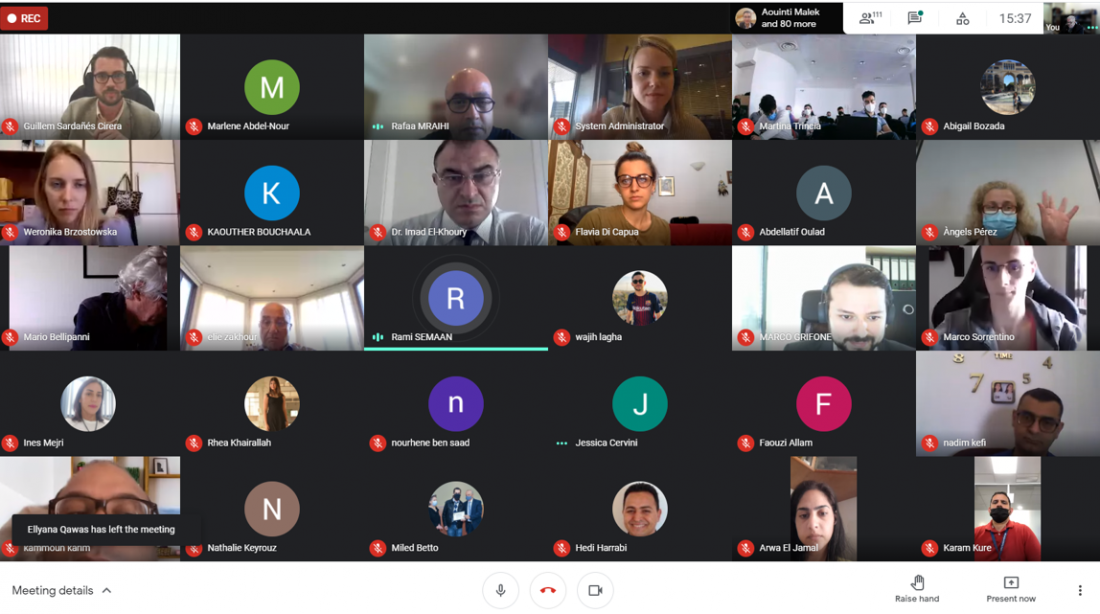148 étudiants rejoignent la première formation internationale entièrement numérique de YEP MED à Barcelone, Tunis, Civitavecchia et Beyrouth

Ce contenu est disponible uniquement en anglais
The first fully digital international training of the YEP MED (Youth Employment in the Ports of the MEDiterranean) project kicked-off last week in four different port communities: Barcelona, Tunis, Civitavecchia and Beirut. The training course finished on the 31st of May 2021. Each port community was responsible for bringing to life a simulated freight forwarding operator and execute international trade operations between the participating countries.
Thanks to the digital tools, a total of 148 students from the four port communities took part in this unique course. The global coordination and organisation of the project was overseen by the Escola Europea, lead partner of the project, whilst local project partners gave national level support. At the international level, participants could interact with students from other Mediterranean countries and support each other in the export operations they need to design, plan and manage as part of the training. Alongside having a widely international character, the student group also featured a high proportion of women in its midst – who formed around 41% of all participants. Making it easier for women to access employment in the Mediterranean transport sector is one of the key bastions of the YEP MED initiative.
This course was the first of the series of the 2nd stage of the YEP MED training. The first stage comprised vocational training (VT) courses that offered an introduction to port logistics and operations. This second stage gives the students an opportunity to gain practical experience and to gain a global understanding of the port-logistic operations first-hand through the use of a newly designed virtual platform that replicates a real port community in the virtual sphere. The students need to work together to design and prepare transport operations that freight forwarders regularly carry out by accessing the Port Virtual Lab. This virtual reality created by the Escola Europea allows students to interact with different companies that are involved in the process of an import / export operation: shippers of several industries as real-life substitute customers (Play Fine Fruits, Play Fine Clothing, Play Fine Cars, Play Fine Pharma, Play Machine Tools, and Play Chemicals), transport operators such as a shipping line, a rail operator or a haulier company (SDG Lines, Port Railway, Play Haulier), customs related entities such as customs brokers and customs administrations (Play Customs Agent and Play Smart Customs) and a Port Community System (MedTrade). You can find out more about these theoretical companies by going to the Port Virtual Lab site.
The Simulated Practice Enterprise is a methodological didactic strategy of "Learning by Doing" – through a digital lens. With the ERP system provided by Click & Cargo, the Escola Europea and its partners have worked to develop a digital environment that promotes simultaneous and integrated development of functional competencies of organisational management (social, human and business) based on a methodological-didactic simulation system that allows for contextualized and experiential knowledge. At the same time, the Click & Cargo system contributes to the vocational guidance of students and the employability of graduates through the creation of role-playing assessments and specific tasks representative of the world of work.
An additional benefit of the YEP MED training courses is the unique benefit gleamed from the international community of teachers. Thanks to the collaboration of more than 30 teachers from Technical and Vocational Education and Training (TVET) centres and professionals of the sector, the students were presented with a distinctively multicultural and very experienced teaching staff – which further added to the authenticity of the heterogenous Mediterranean training.
In these two weeks, I had the opportunity to meet students from Beirut, Ortona, Barcelona and Tunis. We have learned how import and export shipping works through the Click&Cargo ERP platform. We have learned and increased our knowledge in the logistics sector with the collaboration of professionals who explained the different procedures and aspects. I found it very useful and interesting for the students who want to continue their career in the sector
From the point of view of knowledge to be transferred to the students, the training succeeded in achieving the objectives for which it was developed. The content of the sessions is very satisfactory insofar as it offers very varied technical knowledge to be able to use the Click and Cargo. Technical knowledge well founded by theoretical knowledge in international maritime trade techniques. On the educational level, the succession of sessions has been well studied ensuring the progression of the knowledge produced.
These YEP MED VT2 and VT3 courses will take place over the early summer months, concluding before the autumn months and paving the way for the next stage of the training model – the integration of the successful participants in local companies through apprenticeships that will complete the dual training model.
For more information about the YEP MED project you can contact Concha Palacios from the project office at concha.palacios@portdebarcelona.cat







